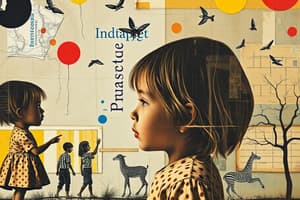Podcast
Questions and Answers
At what age can preschoolers typically use sentences of 6-8 words?
At what age can preschoolers typically use sentences of 6-8 words?
- 3 years
- 6 years
- 5 years (correct)
- 4 years
Which developmental process do preschoolers complete during this stage?
Which developmental process do preschoolers complete during this stage?
- Attachment
- Self-regulation
- Cognitive restructuring
- Separation-individuation (correct)
What is a key aspect of social development observed in preschoolers during play?
What is a key aspect of social development observed in preschoolers during play?
- Associative play (correct)
- Cooperative play
- Competitive play
- Solitary play
By the age of 4, how many words can preschoolers generally understand or use?
By the age of 4, how many words can preschoolers generally understand or use?
What emotions do preschoolers still need from their parents when entering new social settings?
What emotions do preschoolers still need from their parents when entering new social settings?
Which type of speech is typically exhibited by a 3-year-old?
Which type of speech is typically exhibited by a 3-year-old?
Which of the following terms relates to preschoolers' awareness of size in comparison to their peers?
Which of the following terms relates to preschoolers' awareness of size in comparison to their peers?
What type of play is characterized by preschoolers engaging in fantasy activities?
What type of play is characterized by preschoolers engaging in fantasy activities?
What is a key factor in the ability of preschool children to interact socially?
What is a key factor in the ability of preschool children to interact socially?
Which statement best describes physical growth during the preschool years?
Which statement best describes physical growth during the preschool years?
Which of the following is NOT a typical development during the preschool years?
Which of the following is NOT a typical development during the preschool years?
What is a prominent physical characteristic of preschool-aged children?
What is a prominent physical characteristic of preschool-aged children?
During preschool years, which aspect of motor development is most emphasized?
During preschool years, which aspect of motor development is most emphasized?
Which age range defines the preschool period?
Which age range defines the preschool period?
What kind of developments are particularly recognized during the preschool years?
What kind of developments are particularly recognized during the preschool years?
What does the ability to control bodily functions during preschool indicate?
What does the ability to control bodily functions during preschool indicate?
What is the average height gain per year during preschool age?
What is the average height gain per year during preschool age?
At what age can a child typically tie their shoelaces?
At what age can a child typically tie their shoelaces?
Which of the following vital signs is considered normal for a preschool-aged child?
Which of the following vital signs is considered normal for a preschool-aged child?
What gross motor skill is typically developed by the age of 4?
What gross motor skill is typically developed by the age of 4?
What is the average total weight for a child at 4 years of age?
What is the average total weight for a child at 4 years of age?
By what age do preschoolers usually recognize desirable and undesirable appearances in individuals?
By what age do preschoolers usually recognize desirable and undesirable appearances in individuals?
What fine motor skill is developed by a 3-year-old?
What fine motor skill is developed by a 3-year-old?
What is the normal heart rate for a preschool-aged child?
What is the normal heart rate for a preschool-aged child?
What is the primary body zone of interest during Freud's psychosexual stage characterized by genital exploration?
What is the primary body zone of interest during Freud's psychosexual stage characterized by genital exploration?
What major conflicts arise during Freud's phallic stage?
What major conflicts arise during Freud's phallic stage?
In Erikson's psychosocial stage of Initiative vs. Guilt, what is the chief psychosocial task?
In Erikson's psychosocial stage of Initiative vs. Guilt, what is the chief psychosocial task?
What leads to a sense of guilt in Erikson's Initiative vs. Guilt stage?
What leads to a sense of guilt in Erikson's Initiative vs. Guilt stage?
How might children resolve rivalry with their same-sex parent during the phallic stage?
How might children resolve rivalry with their same-sex parent during the phallic stage?
What behavior is typical during the initiative stage of psychosocial development?
What behavior is typical during the initiative stage of psychosocial development?
What might stress a child in the phallic stage according to Freud?
What might stress a child in the phallic stage according to Freud?
Which of the following is NOT a characteristic of the initiative stage in Erikson's theory?
Which of the following is NOT a characteristic of the initiative stage in Erikson's theory?
What primarily influences preschoolers' understanding of good or bad behavior?
What primarily influences preschoolers' understanding of good or bad behavior?
Which characteristic best describes preschoolers' spiritual development?
Which characteristic best describes preschoolers' spiritual development?
How do preschoolers typically interpret punishment?
How do preschoolers typically interpret punishment?
What is one way preschoolers process guilt related to their behavior?
What is one way preschoolers process guilt related to their behavior?
How do preschoolers typically learn religious practices?
How do preschoolers typically learn religious practices?
What aspect of moral development is particularly linked to spiritual development in preschoolers?
What aspect of moral development is particularly linked to spiritual development in preschoolers?
What might help preschoolers cope during stressful times according to the content?
What might help preschoolers cope during stressful times according to the content?
Which statement represents a common misconception about preschoolers' understanding of good and bad behavior?
Which statement represents a common misconception about preschoolers' understanding of good and bad behavior?
What feeling may arise when a child undertakes activities that conflict with the goals of others?
What feeling may arise when a child undertakes activities that conflict with the goals of others?
During which cognitive development phase do children begin to shift from egocentric thought to social awareness?
During which cognitive development phase do children begin to shift from egocentric thought to social awareness?
What is one way preschoolers explain concepts as they relate to their own understanding?
What is one way preschoolers explain concepts as they relate to their own understanding?
What may lead to feelings of guilt and insecurity in a child?
What may lead to feelings of guilt and insecurity in a child?
How do preschoolers often communicate their thoughts to others?
How do preschoolers often communicate their thoughts to others?
What is a common characteristic of preschoolers' understanding of language?
What is a common characteristic of preschoolers' understanding of language?
During the intuitive thought phase of cognitive development, children primarily demonstrate which of the following?
During the intuitive thought phase of cognitive development, children primarily demonstrate which of the following?
What is likely to be used to explore young children's thinking effectively?
What is likely to be used to explore young children's thinking effectively?
Flashcards
Preschool Period
Preschool Period
The preschool years, specifically 3-6 years of age, mark a significant transition in a child's development, characterized by social interactions, bodily control, language development, and the beginnings of formal learning.
Social Interaction in Preschoolers
Social Interaction in Preschoolers
Preschoolers develop the capacity to interact positively with others - both peers and adults. They learn to share, cooperate, and navigate social scenarios.
Bodily Functions in Preschoolers
Bodily Functions in Preschoolers
Preschoolers gain mastery over their bodily functions, including toilet training. This achievement marks a significant step towards independence.
Language Development in Preschoolers
Language Development in Preschoolers
Signup and view all the flashcards
Mental Symbolization in Preschoolers
Mental Symbolization in Preschoolers
Signup and view all the flashcards
Attention Span and Memory in Preschoolers
Attention Span and Memory in Preschoolers
Signup and view all the flashcards
Physical Development in Preschoolers
Physical Development in Preschoolers
Signup and view all the flashcards
Body Image Development in Preschoolers
Body Image Development in Preschoolers
Signup and view all the flashcards
Average weight gain in preschoolers
Average weight gain in preschoolers
Signup and view all the flashcards
Average height gain in preschoolers
Average height gain in preschoolers
Signup and view all the flashcards
Normal body temperature for preschoolers
Normal body temperature for preschoolers
Signup and view all the flashcards
Normal respiration rate for preschoolers
Normal respiration rate for preschoolers
Signup and view all the flashcards
Normal heart rate for preschoolers
Normal heart rate for preschoolers
Signup and view all the flashcards
Normal blood pressure for preschoolers
Normal blood pressure for preschoolers
Signup and view all the flashcards
Gross motor skills at 3 years old
Gross motor skills at 3 years old
Signup and view all the flashcards
Gross motor skills at 5 years old
Gross motor skills at 5 years old
Signup and view all the flashcards
Telegraphic Speech
Telegraphic Speech
Signup and view all the flashcards
Associative Play
Associative Play
Signup and view all the flashcards
Understanding of 'Pretty' and 'Ugly'
Understanding of 'Pretty' and 'Ugly'
Signup and view all the flashcards
Phallic Stage
Phallic Stage
Signup and view all the flashcards
Initiative vs. Guilt
Initiative vs. Guilt
Signup and view all the flashcards
Comparison of Size with Peers
Comparison of Size with Peers
Signup and view all the flashcards
Understanding of Prepositional Phrases
Understanding of Prepositional Phrases
Signup and view all the flashcards
Imaginative and Dramatic Play
Imaginative and Dramatic Play
Signup and view all the flashcards
Oedipus/Electra Complex
Oedipus/Electra Complex
Signup and view all the flashcards
Pre-Conventional Morality
Pre-Conventional Morality
Signup and view all the flashcards
Preoperational Stage
Preoperational Stage
Signup and view all the flashcards
Identification with Same-Sex Parent
Identification with Same-Sex Parent
Signup and view all the flashcards
Conventional Morality
Conventional Morality
Signup and view all the flashcards
Genital Exploration and Sex Differences
Genital Exploration and Sex Differences
Signup and view all the flashcards
Guilt and Conflicting Thoughts
Guilt and Conflicting Thoughts
Signup and view all the flashcards
Egocentric Thinking in Preschoolers
Egocentric Thinking in Preschoolers
Signup and view all the flashcards
Shift from Egocentricity to Social Awareness
Shift from Egocentricity to Social Awareness
Signup and view all the flashcards
Preschool Readiness for School
Preschool Readiness for School
Signup and view all the flashcards
Understanding Time in Preschoolers
Understanding Time in Preschoolers
Signup and view all the flashcards
Preschooler's God Concept
Preschooler's God Concept
Signup and view all the flashcards
Preschooler's Conscience
Preschooler's Conscience
Signup and view all the flashcards
Naïve Instrumental Obedience Orientation
Naïve Instrumental Obedience Orientation
Signup and view all the flashcards
Punishment and Reward Orientation
Punishment and Reward Orientation
Signup and view all the flashcards
Concrete Representations for Preschoolers
Concrete Representations for Preschoolers
Signup and view all the flashcards
Conscience and Spiritual Development
Conscience and Spiritual Development
Signup and view all the flashcards
Religion as a Coping Mechanism
Religion as a Coping Mechanism
Signup and view all the flashcards
Guilt and Illness
Guilt and Illness
Signup and view all the flashcards
Study Notes
Growth and Development Lecture Week 8: Health Promotion of the Preschool and Family
- Learning Objectives:
- Identify major biological developments in preschoolers (ages 3-6).
- Discuss body image development in preschoolers.
- Describe language and play developments in preschool years.
- Recognize psychosexual, psychosocial, cognitive, and moral developments in the preschool years.
Introduction (Preschool Period - 3-6 years)
-
Abilities: Interact cooperatively with other children and adults; control bodily functions; experience brief and prolonged periods of separation; use language for mental symbolization; increased attention span and memory.
-
Physical Proportions: No longer squat and pot-bellied; become slender, sturdy, graceful, agile, and posturally erect.
-
Physical Growth: Rate slows and stabilizes; most children are toilet trained; motor development increases in strength and refinement.
Biological Development
- Weight: Average weight gain is approximately 2-3 kg per year; ~14.7 kg at 3 years, ~16.7 kg at 4 years, ~18.7 kg at 5 years.
- Height: Average height gain is approximately 5-7.5 cm per year; ~95 cm at 3 years, ~103 cm at 4 years, ~110 cm at 5 years.
Preschool Age Group - Vital Signs
- Temperature: 36.5 – 37.3°C
- Respiratory Rate: 16-22 breaths per minute
- Heart Rate: 70-115 beats per minute
- Blood Pressure: 100/55 mm Hg
Gross Motor Development
- Abilities: Ride a tricycle, stand on one foot for a few seconds, go up stairs using alternating feet, broad jump, skip and hop on one foot, walk downstairs and upstairs using alternating footing, skip and hop on alternating feet, jump rope from 30 cm height, walk backward with heel to toe, balance on alternate feet with eyes closed. Ages are listed in table format.
Fine Motor Development
- Abilities: Build a tower of 9-10 cubes, adeptly place small pellets, make a circle with facial features, use scissors to successfully cut out a picture following an outline, able to lace shoes but not able to tie bow, copy square and traces a cross and diamond, able to tie shoelaces, use scissors and simple tools or pencils, copy diamonds and triangles, print a few letters, numbers or words, and handedness is established (90% right-handed). Ages are listed in table format.
Development of Body Image
- Language comprehension: Recognition of desirable and undesirable appearances.
- Awareness: Differences in skin color and racial identity.
- Word association: Understanding of words such as "pretty" and "ugly".
- Peer comparison (Age 5): Comparison of size to peers, leading to awareness of being large or small.
Development of Body Image (continued)
- Separation-individuation: Anxiety associated with strangers and separation is overcome.
- Relationships: Easy to get along with unfamiliar people, and tolerate brief periods of separations from parents. Guidance, reassurance, and approval are still needed.
- Prolonged separation (illness, hospitalization): Difficult, but preschoolers respond well to preparation and clear explanations.
Social Development (Language & Play)
- Language milestones: 900 words, sentences of 3-4 words, telegraphic speech, 1500 words, sentences of 5-6 words, knowledge of colors, following prepositional phrases, 2100 words, sentences of 6-8 words, knowledge of colors, knowledge of coins, knowledge of days, months, and weeks. Ages are listed in table format.
- Play types:
- Associative play: Group play in similar or identical activities, but without rigid organization or rules.
- Preschoolers' activities: Enjoy a sense of accomplishment from activities like building blocks.
- Imaginative/dramatic play: Typical of preschoolers who enjoy fantasy play.
Personality, Cognitive, and Moral Development
-
Freud: Psychosexual stage (phallic); genitalia become a sensitive area; primary body zone: genital area; Oedipus and Electra complexes
-
Erikson: Psychosocial stage (initiative vs. guilt); children are energetic learners engaging in play, work, and everyday life; conflict arises when children overstep boundaries, leading to guilt.
-
Cognitive development: Readiness for school and learning; preoperational phase (ages 2-7); pre-conceptual phase (2-4 years), intuitive thought phase (4-7 years); egocentricity is still present; understands basic concepts like time and opposites; believe thoughts are powerful.
-
Kohlberg: Moral judgment stages of development: punishment and obedience orientation (2-4 years), naive instrumental orientation (4-7 years).
-
Moral development: Children's moral development is at a basic level, with little concern for the reasons behind actions, adhering to rules due to freedom or restriction.
-
Spiritual development: Develop concrete concept of God often similar to an imaginary friend; understand simple religious stories and memorize short prayers/rituals; benefit from concrete representations like religious books and animated shows.
Studying That Suits You
Use AI to generate personalized quizzes and flashcards to suit your learning preferences.




